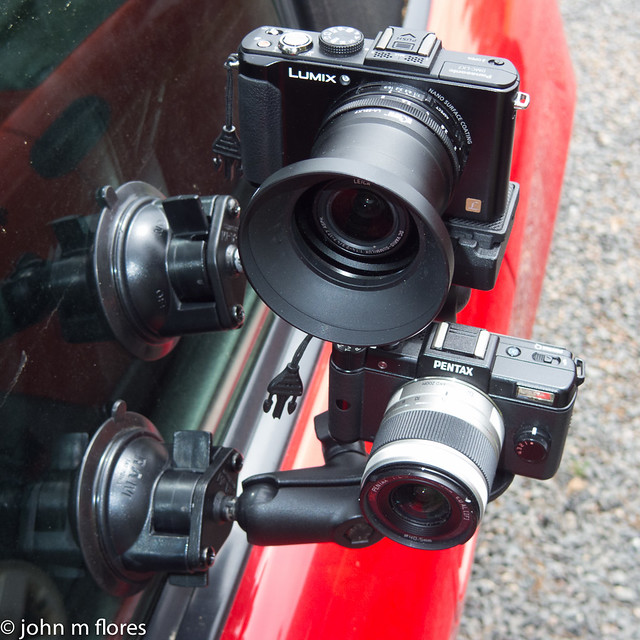I brought a Panasonic LX7 and a Pentax Q to a recent automotive press event where I got to test drive a number of electric and hybrid cars (along with some hooning in a Miata and wicked looking matte grey Hyundai Veloster Turbo). A Nissan GTR, Chevy Camaro Hot Wheels Edition, Cadillac CTS-V and a passel of Rolls Royce and Jaguar convertibles where also on hand but I avoided driving them. Ignorance is bliss, right?
For the interior shots, I used the LX7 mounted with a RAM suction mount. I added a Manfrotto quick release plate to make it easier to set up the shot and a third party lens hood (and accessory adapter) to help protect the extending lens and try to control lens flare; the LX7 is very prone to lens flare. What would really make it easy is a flip-twist screen, but no single camera had all of my desired features, and I judged the LX7 to be closest. Shots like this is where the 24mm lens (vs the 28mm of the Sony RX100) comes in handy. Camera was set to shoot 1080P HD, auto exposure, face detect AF. Audio was from the built-in mic and image stabilization was on. On the Nissan LEAF interior shot, I’ve actually cropped the final image a bit top and bottom. At the end of the video I switch to the interior shot so you can get a sense of the LX7’s IQ and auto exposure in these changing conditions.
The exterior shots where with the Pentax Q and the 02 Standard Zoom set at its widest focal length (approx. 27.5mm). The camera was mounted on the glass window (in other videos it is mounted on the metal body of the car) with another RAM suction mount. Shot 1080P, auto exposure (we drive from shade to bright sun, so I let the camera decide), image stabilization on.
Audio was with the LX7’s built-in mic. It’s ok, not great. I did want to capture ambient sounds – the revving of gas-powered cars compared to the relative quiet of the electric cars, so a lavalier would not have worked as well here. Need to investigate other options.
Overall I was pretty pleased with the results. Image stabilization really helped to get usable shots, although in some of the turns you can see the Pentax Q image stabilization panning the camera – hint, look in the corners for the edge of the car to move. The exterior shots are quite challenging with the transitions from sun to shade. A bigger sensor camera with greater dynamic range would not doubt handle the shot better, but I’d need substantially bigger support, and would have to make some decisions about depth of field. The interior shots are ok – the LX7 did a pretty good of exposing the subject and letting the backgrounds blow out to white when necessary. Again, a bigger sensor camera would handle the dynamic range better; I may have to test the Nikon V1 in a similar situation. It helps that the target playback device are computer and tablets, not 40″+ televisions where IQ issues will be more noticeable, but on the other hand, there is this acceptance that GoPro style footage is supposed to have a rough edge to it and not feel all Hollywood. The biggest issue of the day was battery life. The Q ate three batteries pretty quickly, while the LX7 went through one and a half in the same time. I may need to buy more batteries or bring a charger next time.
Editing was with Final Cut Pro X. Syncing the two clips was as easy as marking the point at the beginning where I open the door and matching them up on the timeline.
Seven Minutes in a Fiat 500e from john flores on Vimeo.
Fifteen Minutes in a 2013 Nissan Leaf from john flores on Vimeo.
Three and a half minutes in a Mercedes Benz GLK 250 Bluetec from john flores on Vimeo.

